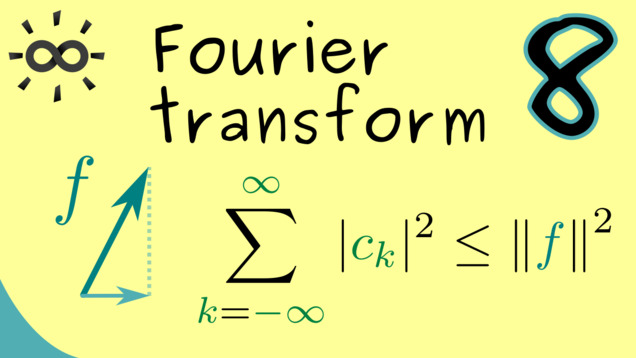
-
Title: Bessel’s Inequality and Parseval’s Identity
-
Series: Fourier Transform
-
Chapter: Fourier Series
-
YouTube-Title: Fourier Transform 8 | Bessel’s Inequality and Parseval’s Identity
-
Bright video: https://youtu.be/nRuLT4l8DGU
-
Dark video: https://youtu.be/Na_O7SZQKkA
-
Quiz: Test your knowledge
-
Dark-PDF: Download PDF version of the dark video
-
Print-PDF: Download printable PDF version
-
Thumbnail (bright): Download PNG
-
Thumbnail (dark): Download PNG
-
Subtitle on GitHub: ft08_sub_eng.srt missing
-
Timestamps (n/a)
-
Subtitle in English (n/a)
-
Quiz Content
Q1: Consider $V = \mathbb{R}^4$ with the standard inner product and the ONS given by $(e_1, e_2, e_3)$, where $e_1 = (1,0,0,0)^T$, $e_2 = (0,1,0,0)^T$, and $e_3 = (0,0,1,0)^T$. How does Bessel’s inequality look like in this case for $x = (x_1, x_2, x_3 , x_4)^T \in V$.
A1: $$ \sum_{k = 1}^4 | x_k | \leq | x |^2 $$
A2: $$ \sum_{k = 1}^3 | x_k |^2 \leq | x | $$
A3: $$ \sum_{k = 1}^3 | x_k |^2 \leq \sum_{k = 1}^4 | x_k |^2 $$
A4: $$ \sqrt{\sum_{k = 1}^2 | x_k |^2} \leq | x |^2 $$
Q2: Consider a finite-dimensional vector space $V$ with the standard inner product and an ONB $(e_1, \ldots, e_n)$. Is Parseval’s identity satisfied in this case?
A1: Yes, we always have $$ \sum_{k = 1}^n |\langle e_k, x \rangle|^2 = | x |^2 $$ for all $x \in V$.
A2: No, only in special cases. We only have $$ \sum_{k = 1}^n |\langle e_k, x \rangle|^2 \leq | x |^2 $$ for all $x \in V$ in general.
A3: No, it is never fulfilled.
-
Last update: 2024-11